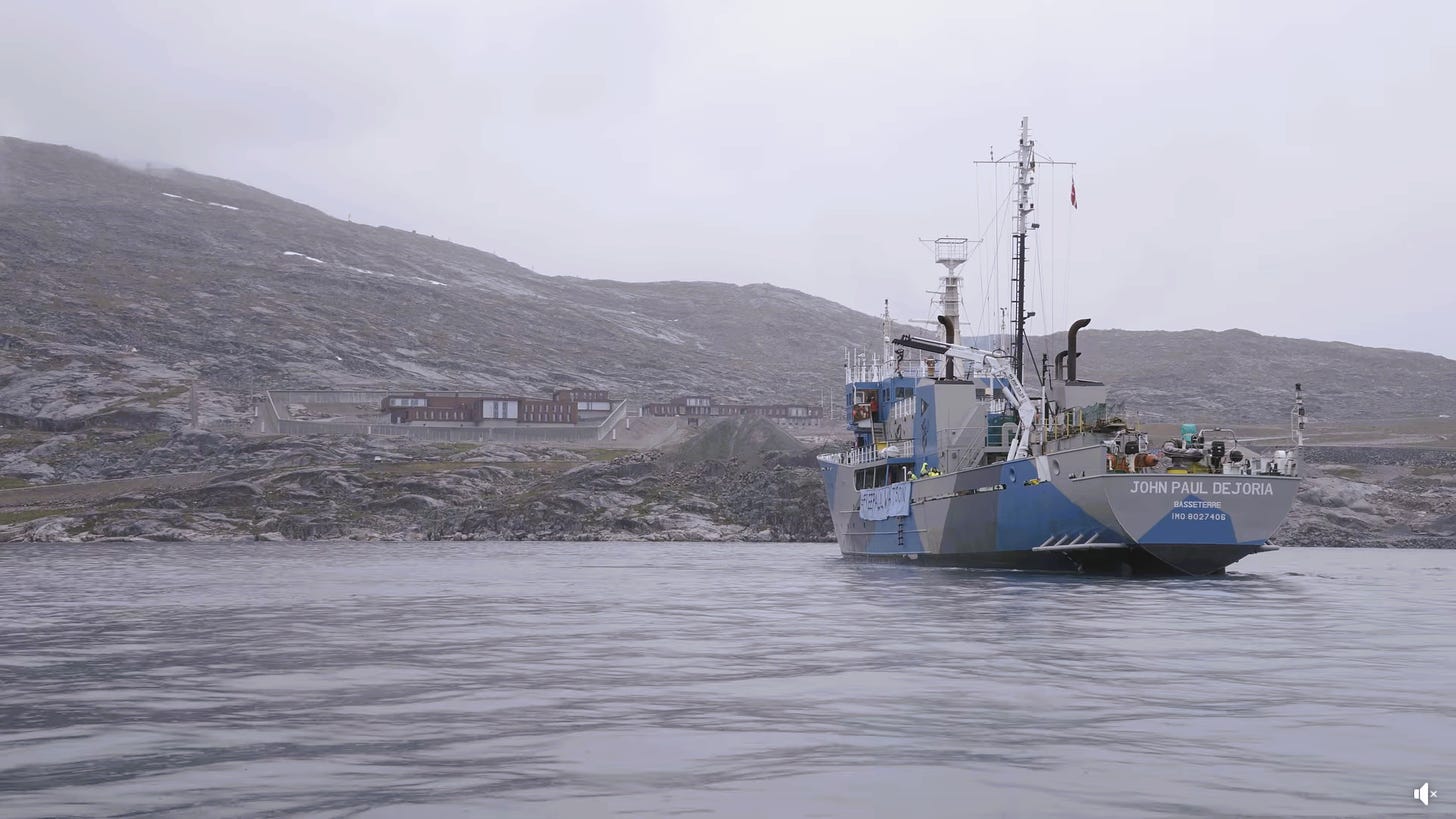Paul Watson Avoids Extradition to Japan
The anti-whaling activist will be free to travel to France, where his family resides. Watson had lately complained that he could not see his children and family for Christmas, if not released soon.
Early this morning, the Danish Ministry of Justice announced that it will not grant the request from the Japanese authorities for the activist Paul Watson to be extradited to Japan. The decision has been taken after obtaining further information from the Japanese authorities, and ‘taking all aspects into consideration’. See the full text of the statement below, including a statement by the Danish Minister of Justice, Peter Hummelgaard.
Watson will be released from the detention center in Nuuk, the capital of Greenland. He is free to leave Greenland, but on condition that he travels directly to France. For practical reasons, he can alternatively go to Copenhagen first, since there are no direct flights to France from Greenland. Watson is born in Toronto, carries an American passport and his family lives in France. During his detention in Nuuk, he allegedly applied with President Macron for asylum in France.
Among other things, the Ministry notices that Japan failed to give any assurance that the time that Watson has been held in Nuuk would be deducted from any possible prison time ordered, if he is tried in Japan. This is part of the aspects taken into consideration when denying the request for extradition.
The Ministry also mentions that since there is no bilateral agreement of extradition between Denmark and Japan, the matter needed unilateral scrutiny from the Danish side.
Watson’s yacht waiting outside the detention center ‘Anstalten’ in Nuuk earlier this year. Still from video on his foundation’s web site.
Full statement from the Ministry of Justice (translated from Danish):
Ministry of Justice does not grant Japanese authorities' request for extradition of Paul Watson
December 17, 2024
The Ministry of Justice has today decided not to grant the Japanese authorities' request for extradition of Paul Watson for prosecution in Japan. The decision has been made based on an overall assessment of the circumstances of the specific case.
On July 30, 2024, the Japanese authorities requested the extradition of the American-Canadian citizen Paul Watson for prosecution in Japan for two offenses committed against a Japanese ship in Antarctica in February 2010.
The extradition request has been processed in accordance with the rules of the Greenlandic Extradition Act, which sets out a number of conditions that must be met before extradition can be considered. It is noted that no extradition agreement has been concluded with Japan.
The Attorney General and the Greenland Police have each provided a statement on the circumstances of the case for the Ministry of Justice's decision. It appears from the statements that the authorities have assessed that the conditions for extradition under the Greenlandic Extradition Act have been met.
In light of the total time that Paul Watson could be expected to be detained until a possible decision on extradition could be made, combined with the nature of the acts for which extradition is sought, and the fact that the acts date back more than 14 years, on 27 November 2024, the Ministry of Justice, through the Ministry of Foreign Affairs, requested information from, among others, the Japanese authorities on whether the time that Paul Watson has been detained in Greenland will be deducted from any prison sentence that Paul Watson may be sentenced to in Japan for the matters in question.
Subsequently, there has been correspondence between the Ministry of Justice and the Japanese authorities on this matter. Based on the correspondence with the Japanese authorities, the Ministry of Justice believes that it cannot be assumed with the necessary certainty that the time that Paul Watson has been detained in Greenland would be fully deducted from any prison sentence that he may be sentenced to in Japan.
Against this background and in light of the age and nature of the circumstances to which the extradition request relates, the Ministry of Justice has, based on an overall assessment of the case, found that the request for extradition should not be granted, cf. Section 15, subsection 1 of the Extradition Act.
Minister of Justice Peter Hummelgaard says:
– The Ministry of Justice has today made a decision not to grant Japan's request for the extradition of Paul Watson. The decision has been made based on an overall assessment of the circumstances of the specific case. In the view of the Ministry of Justice, in light of the total time that Paul Watson will be detained until a possible decision on extradition could be made, combined with the nature of the circumstances, and that they date back more than 14 years, it has been of central importance to ensure that the time that Paul Watson has been detained in Greenland will be deducted from any custodial sentence that he may be sentenced to in Japan.
Based on correspondence with the Japanese authorities on this matter, the Ministry of Justice believes that it cannot be assumed with the necessary certainty that this will be the case.
However, I would like to make it very clear that this decision does not reflect that we, on the Danish side, share the concerns that have been raised in certain circles about the Japanese legal system and the protection of human rights in Japan in relation to the specific case. Japan is a democratic society governed by the rule of law that respects fundamental human rights. There has also been a good and close dialogue with the Japanese authorities.
Paul Watson and his defense attorney, as well as the Greenland Police, at whose request Paul Watson has been detained so far, have been informed of the Ministry of Justice's decision.




